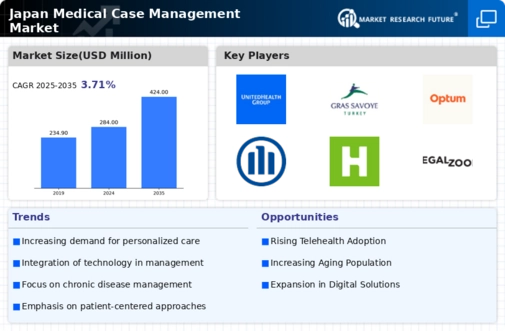Aging Population Demographics
The aging population in Japan is a critical driver for the medical case-management market. As the proportion of elderly individuals increases, the demand for comprehensive healthcare services rises correspondingly. By 2025, it is projected that over 30% of the population will be aged 65 and older. This demographic shift necessitates enhanced case management services to address complex health needs, including chronic disease management and coordination of care. The medical case-management market is likely to expand as healthcare providers seek to implement tailored solutions for this demographic, ensuring that elderly patients receive appropriate and timely care. Furthermore, the increasing prevalence of age-related conditions, such as dementia and cardiovascular diseases, further emphasizes the need for effective case management strategies to improve health outcomes and reduce healthcare costs.
Rising Healthcare Expenditure
Japan's healthcare expenditure has been on an upward trajectory, which significantly impacts the medical case-management market. In 2025, healthcare spending is expected to reach approximately ¥42 trillion, reflecting a growth rate of around 5% annually. This increase in expenditure is driven by the need for advanced medical technologies, improved healthcare infrastructure, and the rising costs associated with treating chronic illnesses. As healthcare budgets expand, there is a growing emphasis on efficient resource allocation and patient-centered care. Consequently, medical case-management services are becoming essential for optimizing healthcare delivery, reducing unnecessary hospitalizations, and enhancing patient satisfaction. The market is likely to benefit from this trend as healthcare providers invest in case management solutions to streamline operations and improve overall care quality.
Technological Advancements in Healthcare
Technological advancements are reshaping the landscape of the medical case-management market in Japan. Innovations such as telemedicine, electronic health records (EHR), and data analytics are enhancing the efficiency and effectiveness of case management services. In 2025, it is anticipated that the adoption of telehealth solutions will increase by over 40%, enabling healthcare providers to offer remote consultations and continuous monitoring of patients. These technologies facilitate better communication among healthcare teams and improve patient engagement, which is crucial for successful case management. Moreover, the integration of artificial intelligence (AI) in case management processes may lead to more personalized care plans and improved health outcomes. As these technologies continue to evolve, they are likely to drive growth in the medical case-management market, providing innovative solutions to meet the demands of a changing healthcare environment.
Government Initiatives and Policy Support
Government initiatives and policy support play a pivotal role in shaping the medical case-management market in Japan. The Ministry of Health, Labour and Welfare has been actively promoting integrated care models that emphasize collaboration among healthcare providers. In 2025, policies aimed at enhancing case management services are expected to be further developed, focusing on improving access to care and ensuring quality services for patients. These initiatives may include funding for case management training programs and incentives for healthcare organizations to adopt best practices. As the government continues to prioritize healthcare reform, the medical case-management market is likely to benefit from increased funding and resources, fostering an environment conducive to innovation and improved patient care.
Increased Focus on Chronic Disease Management
The rising prevalence of chronic diseases in Japan is a significant driver for the medical case-management market. Conditions such as diabetes, hypertension, and respiratory diseases are becoming increasingly common, affecting millions of individuals. By 2025, it is estimated that over 50% of the adult population will be living with at least one chronic condition. This trend necessitates a shift towards proactive case management strategies that emphasize prevention, early intervention, and ongoing support. Healthcare providers are likely to invest in case management services to coordinate care across multiple providers, ensuring that patients receive comprehensive treatment plans tailored to their specific needs. The medical case-management market is expected to grow as organizations seek to implement effective chronic disease management programs that improve patient outcomes and reduce healthcare costs.

















Leave a Comment